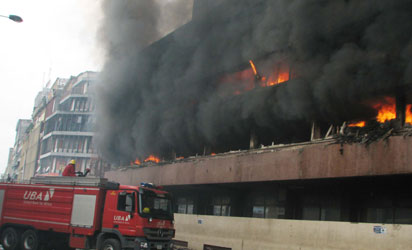
•Claims also decline
•Operators’ bemoan public apathy
By Rosemary Iwunze
Patronage of fire insurance appears to have been reversed as growth rate in premium amongst major insurance companies suffers set back.
Financial Vanguard’s findings on cumulative financial records of about eight of the insurance companies show that the fire policy premium at N13.4 billion, grew by 19 percent year-on-year, YoY, as against the 59.2 percent recorded in the corresponding period of 2019.
In 2019, fire insurance skyrocketed by 59.2 per cent YoY to N11.19 billion from N7.03 billion in 2018, a sort of recovery from the 35.5 percent decline recorded in the 2018 figure against the N10.9 billion in 2017.
READ ALSONigeria: A country that kidnaps, rapes, murders her school children
However, the figure was in the decline in 2018, as it went down by 35.5 per cent to N7.03 billion from N10.9 billion recorded in 2017.
The development comes against the backdrop of recorded fire incidences across the country with the value of assets destroyed put at annual figure of N32 billion.
According to the Federal Fire Service, FFS, in 2020, the Service attended to 3,555 fire calls and 353 rescue emergencies. Also, it said that 1,100 lives were saved while 147 were lost. Estimated property saved was N1.351 trillion with an estimated property loss of N32.12 billion.
Meanwhile claims payment by the eight insurers has also followed the same trend as it declined by 11.4 per cent YoY in 2020 to N7.7 billion from N8.71 billion in 2019.
In 2019, claims payment increased by 35.8 per cent to N9.1 billion from N6.7 billion in 2018.
However, the figure declined by 24.7 per cent to N6.7 billion in 2018 from N8.9 billion in 2017.
The companies are Axa Mansard, Consolidated Hallmark, Cornerstone Insurance, Linkage Assurance, Nem Insurance, Sovereign Trust, Universal Insurance as well as Veritas Capital Assurance.
Experts are of the opinion that the fluctuations in claims payment may not be unconnected to the apathy of majority of Nigerians towards taking up insurance. This is even as they argue that public building insurance has the capacity to jerk up the sector to a trillion naira market.
It is in line with this that the National Insurance Commission (NAICOM) and the Federal Fire Service recently entered into partnership to commence the enforcement of compulsory public building liability insurance in earnest across the country.
However stakeholders have argued that the regulatory body needs to enter into partnership with other bodies and not only the fire service to achieve maximum results.
Experts’ opinion
Insurance experts have argued that operators must boost awareness drive on the importance of building insurance even as more partnerships with relevant bodies must be formed.
Speaking to Insurance Vanguard, General Manager/Lead, Business Development, at African Alliance Insurance, Mr. Steve Ajudua, said: “There is potential of over a trillion naira income in the compulsory building insurance and other products for the industry and there is need for strict enforcement of that line of business.”
Ajudua said that the sector needs to up its game in propagating the benefits inherent in the compulsory insurance products, adding that it offers the industry a huge opportunity to increase insurance penetration as well as grow the economy.
In his words: ‘‘More purchase of public building insurance is necessary to boost the contributions of building insurance to total revenue of operators which is still highly insignificant. A boost in the contribution will also place operators in a good position to settle any genuine claim.”
Speaking on the issue, President of the Nigerian Council of Registered Insurance Brokers, NCRIB, Mrs Bola Onigbogi, said that government must help the industry by taking more strategic positions in enforcement of compulsory insurance policies, stressing that there must be conscious efforts to continually sensitize the public on the importance of insurance and this must start from the top.
He stated: “It should be noted that a nation cannot develop beyond its insurance sector. In other words, the poor state of our nation’s economy today cannot be divulged from the poor state of the insurance industry.
For example, most companies that ought to have contributed immensely to the development of the nation are no more in existence, because they could not get succor when their ship went down. Many small business owners could not grow beyond a year because they did not factor in insurance from onset. Insurance is key to the development of any economy.
“When there is a fire disaster or building collapse, if there is insurance in place, the government will not need to spend money that is meant for development of other things on rehabilitating the victims or businesses. This is because insurance must provide succour to the people when they suffer fire incidents. So it is high time states know that if there is insurance, they don’t need to spend the money for infrastructure on rehabilitating the victims of fire disaster or any other accident.”
Also speaking, immediate past Managing Director of Continental Reinsurance, Mr Femi Oyetunji, said: “One of the things that is lacking amongst the general populace is that the confidence in insurance is not there. If I know that the fire-fighting equipment will work, I am more readily inclined to take home insurance. I think that the partnership between NAICOM and the Fire Service will give the needed confidence to the general populace.
“We need to work with the society of engineers; we need to work with the water works to make sure that water is available; we need to work with PHCN or the DisCos to ensure that the quality of transformers or things that can cause fire are of high standard. So, the fire corporation is just the obvious one. But it is not something that the insurance companies can do on its own; it is not something that NAICOM can do on its own; we need to engage at every stage with everybody that is involved in protecting lives and property.”
What the law says
Public building insurance is one of the five compulsory insurance products stipulated by the Insurance Act 2003, but has been far from implementation at both federal and state levels.
Section 65 of the Insurance Act 2003 requires the owner or occupier of every public building to be insured against liability for loss or damage to property or death or bodily injury caused by collapse, fire, earthquake, storm or flood.
The Act defines a public building as one to which members of the public have access for educational, recreational, medical and commercial purposes. The penalty for non-compliance is a maximum fine of N100,000 or one-year imprisonment or both.
Also, Section 64 of same Act, stipulates that for insurance of buildings under construction, every owner or contractor of any building under construction with more than two floors must take an insurance policy to cover liability against construction risks caused by his negligence or that of his servants, agents or consultants which may result in death, bodily injury or property damage to workers on site or members of the public.
This insurance policy also covers liability for collapse of buildings under construction. Failure to comply with this provision is an offence punishable with a fine of N250,000 or three years imprisonment or both.
The post Growth in fire insurance slows down appeared first on Vanguard News.










![[Video] Speaking In Tongues - Oyereyi](https://1.bp.blogspot.com/-_AsYnQoWjCs/YTy9dQfbceI/AAAAAAAAQyM/bUPsq9lMM_UHqmspyN2qCp4x5hAc2iUywCLcBGAsYHQ/w680/Screenshot_20210911-152304%257E2.png)






Advertise your business here at cheap rate and get large audience to your market. Call/Msg Teemikemedia: 07060733664 to get started.